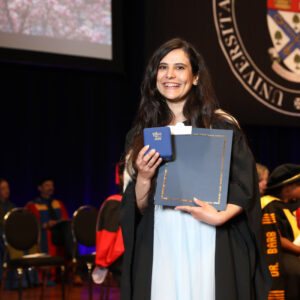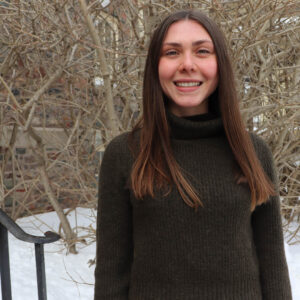Douglas Ruck, KC, Chair of the Board of Governors, opened the 234th Encaenia at the University of King’s College by reciting a quote by poet Maya Angelou.
“Do the best you can until you know better,” urged Ruck, BA’72, to the graduands, dressed in long robes and hoods. “Then when you know better, do better.”
This “do better” mantra is something taken to heart by the two young women awarded medals at Encaenia: Moroccan-born Nour Hafid, BJ’24, presented with the Governor General’s Silver Medal, and Anna Dugandzic, BSc(Hons)’24, from Halifax, NS, the King’s Medal recipient.
Both honours are awarded on the basis of academic excellence and achievement, but King’s President William Lahey highlighted the recipients’ other qualities—kindness, caring and compassion—in presenting the medals.
Nour Hafid
 Nour Hafid, 30, was surprised to hear her name called by President Lahey. She rushed to the stage from deep in the audience, stopping to stand beside him with arms clasped in front of her and a smile playing on her lips. Afterwards, she related that it was deeply emotional to hear herself described with adjectives including “thoughtful, meticulous and witty” and “generous, quiet and kind.”
Nour Hafid, 30, was surprised to hear her name called by President Lahey. She rushed to the stage from deep in the audience, stopping to stand beside him with arms clasped in front of her and a smile playing on her lips. Afterwards, she related that it was deeply emotional to hear herself described with adjectives including “thoughtful, meticulous and witty” and “generous, quiet and kind.”
It’s been an eventful year for Hafid. She had just arrived at King’s for the one-year Bachelor of Journalism program when a 6.8-magnitude earthquake struck Morocco, killing more than 2,900 people and injuring thousands more. The earthquake and its aftershocks caused wide-spread devastation, especially to remote mountain villages.
President Lahey picked up the story: “While most journalists are adrenalin-fuelled, Nour is unusually calm. That calm was apparent when a magnitude 6.8 earthquake struck her home country the day after she got to Halifax. Despite this, and after reassuring her instructors that her family was okay, she got right down to work in the BJ Boot Camp, an intense eight weeks of journalism instruction. She displayed strong nerve and a sensitive ear in producing a boot camp audio item on the earthquake.”
Hafid is no stranger to hardship. Prior to coming to King’s, she worked with refugees in the north of the UK, hearing about their difficulties and helping them to find a way through. She was ideal for the job, compassionate and resourceful. Not only that, she speaks four languages—her native tongue Arabic, as well as French, English and Turkish—and was able to connect with the newcomers on a deeper level.
In fact, it was this work with the British Red Cross that sparked an interest in journalism. While her first undergraduate degree dealt with numbers—she studied business and finance at the Cardiff Met University in Wales—her next degree saw her delight in words. She searched around for journalism programs in the UK, Europe and Canada, eventually landing on King’s, attracted by the hands-on nature of the learning experience.
“In a way, it doesn’t feel like you’re a student because you’re plunged right into a newsroom, doing the work.” She also liked the program because it offers an internship. Her four-week placement was with the editorial team at Nimbus Publishing, the Atlantic Region’s largest book publisher.
Despite how busy she was, and how much learning is crammed into the one-year program, Hafid revelled in the experience. She found herself continually amazed: by her affinity for audio storytelling, her unexpected love of creative nonfiction writing and the way she gravitated to publishing.
“You may come into this degree thinking you know what you want and then find yourself going in a totally different direction,” she says. Hafid is open to being surprised by what’s next: she’s taking her time to find a job where she can be creative.
Anna Dugandzic

Reached in Italy through a Zoom link, Anna Dugandzic, 22, still can’t quite believe what happened. Unable to attend graduation events because of her summer job as a camp counsellor, Anna tuned into the livestream recording of Encaenia. Did President Lahey actually say her name as the winner of the King’s Medal? Did he really say all those wonderful things about her?
“It was a huge surprise for me,” remarks Dugandzic, from Rome. She graduated from King’s with a Bachelor of Science degree, with first class honours in biochemistry and molecular biology and an undergraduate certificate in genetics. “Being able to know your President is huge, and so special for him to say those words about me.”
It’s not only that Dugandzic is an excellent student—her grade point average is north of 4.2—she was also named ACAA Athlete of the Year at King’s. She played badminton and soccer for the Blue Devils.
Being a varsity athlete is demanding to say the least. Her days began with 7 a.m. practices three or four days a week, along with tournaments and travel on the weekend.
But Dugandzic says being an athlete enhanced rather than detracted from her studies. Through her four years at King’s, she learned to be organised, leaving no room for procrastination. When she was on the court or the soccer pitch, she gave 100 percent. When she wasn’t, she focused completely on her studies.
“Plus the stress relief is huge,” she says. “There’s nothing like going to practice and having a laugh with my teammates. For me, sports are a lifesaver.” She explained that her family, teammates, coaches and Athletics Director Neil Hooper, all provided her with immense support and encouraged her to be her best. “I couldn’t have don’t it without them.”
Rather than doing the Foundation Year Program, Dugandzic plunged right into science classes, mainly at Dalhousie. She has a natural affinity for biochemistry and found even the most difficult classes to be enjoyable. Last summer, she had a research job with the Centre for Water Resource Studies at Dalhousie, which did groundbreaking work during the pandemic by detecting Covid-19 variants in wastewater. Her honours research project built on that research by searching for other viruses, such as influenza, in lake water.
According to President Lahey, her research “has been significant, outstanding and at a level that can only be expected of a graduate student.”
After four years of go, go, go, Dugandzic is happy to take this breather in Italy, working with children, experiencing a different culture and travelling. There’s time to decide what to do next, whether to pursue a career in research or study medicine. “I do know I am extremely passionate about helping others, and I want to figure out how I can best accomplish that,” she says.

